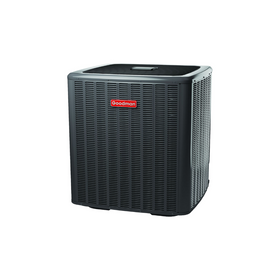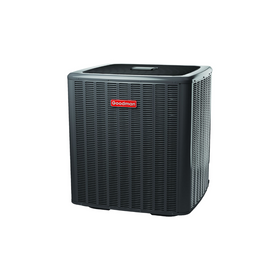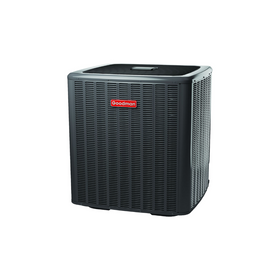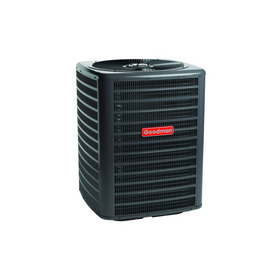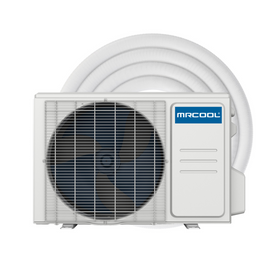
Split System Heat Pump Water Heaters
Last Updated: Mar 29, 2025Hot water in the home is a luxury that most of us take for granted. Our showers, sinks, washing machines, dishwashers, and other appliances all have direct hot water connections, allowing for an almost instantaneous flow of pleasantly hot water for our use. The energetic cost of that "creature comfort," however, is exceptionally high. Most traditional, tank-style water heaters use between 4,000 and 5,000 watts of energy. Even if no one is at home for long hours of the day, your water heater will continuously cycle on and off so that you have a steady supply of hot water on hand.
Table of Contents
- What Is a Split System Heat Pump Water Heater?
- Are Split System Heat Pump Water Heaters Different From Hybrid Heat Pump Water Heaters?
- What Are the Advantages of Split System Heat Pump Water Heaters?
- Do Split System Heat Pump Water Heaters Save Energy?
- Is a Split System Heat Pump Water Heater Environmentally Friendly?
- How Long Does a Split System Heat Pump Water Heater Last?
- How To Install a Split System Heat Pump Water Heater?
- Do Smart Split System Heat Pump Water Heaters Exist?
- What Are The Best Split System Heat Pump Water Heaters Brands?
- What Are The Benefits of a Split System Heat Pump Water Heater?
- What Are The Cons of a Split System Heat Pump Water Heater?

On-demand or tankless water heaters and water heater timers can help to lower the energy consumption associated with hot water use. However, the United States Department of Energy finds that home water heating accounts for nearly 17 percent of a home's energy use. It consumes more energy than all other household appliances combined. Along with space heating, almost two-thirds of households' power is dedicated to generating some heat for our homes.
Fortunately, recent innovations in home heating technology have also led to significant energy efficiency gains in-home water heating. Mini-split heat pumps are one of the most cost-effective ways to cut back on your home heating costs. By transferring heat instead of generating it, ENERGY STAR says that its certified ductless mini-split heat pumps use 60 percent less energy than standard home electric resistance-based heating systems. You can read a more in-depth guide about heat pumps at this Rise guide.
The principle of transferring heat instead of generating is now being applied to heating water for our homes. The split system heat pump water heater is one such technology that comes with several advantages over both traditional water heaters and hybrid heat pump water heaters. Below, we take a look at how these systems work so that you can decide if this energy efficiency upgrade might be suitable for your household.

What Is a Split System Heat Pump Water Heater?
Before explaining how a split system heat pump water heater works, let's review the basics behind heat pump technology. Instead of creating heat via a resistance element, heat pumps use electricity to move heat from one place to another. Many people liken heat pump technology to a refrigerator working in reverse. The process of moving or transferring heat instead of generating heat is significantly more energy-efficient. Trane, one of the leading HVAC manufacturers in North America, estimates that a heat pump can transfer 300 percent more energy than it uses. Compare this to even the best high-efficiency gas furnace, which has a 95 percent efficiency rating. Heat pump technology can drastically lower the energy we use for home heating while also reducing the demand for fossil fuels like coal and natural gas.
Heat pump water heaters rely on the same principle of using electricity to move heat from one place to another to reduce energy consumption drastically. With most heat pump water heaters, the compressor unit is located inside the home. A split system heat pump water, in contrast, has a different configuration. Like mini-split heat pumps, the compressor is located outside the house, and it takes its heat from outdoor air rather than indoor air. Split-system heat pump water heaters were designed initially for use in countries like Japan with relatively mild winter temperatures. However, as heat pump technology has improved, these mini-split systems are now effective in areas with significantly colder temperatures. Some split system heat pump water heaters can effectively generate hot water even when outdoor winter temperatures drop to -25°F.
Are Split System Heat Pump Water Heaters Different From Hybrid Heat Pump Water Heaters?
The primary difference with a split system heat pump water heater is where the compressor's location. Most hybrid heat pump water heaters place the pump and compressor within the home. Hybrid options rely on a fan that pulls in conditioned air from within your home via an evaporator. The refrigerant in the evaporator absorbs heat from the air, eventually passing the heat through the condenser coil around the tank. This process transfers the heat to the water. With a hybrid system, you essentially utilize the heat within your home to heat the water in your tank. A split system heat pump water heater, on the other hand, is located outside the home. The compressor extracts heat from outdoor air with this system instead of the conditioned air inside your home. With both types, cooler air is "dumped" by the heat pump after the heat is extracted and passed through the refrigerant and the coils.
What Are the Advantages of Split System Heat Pump Water Heaters?
One of the main advantages of a split system heat pump water heater over a hybrid heat pump water heater is that the cool air is not dumped into your home in the winter. Hybrid heat pump systems are certainly more energy efficient than traditional tank-style water heaters. However, they do come with an "energy penalty" in the winter as they extract the heat from inside your home and release cooler air back into your home. This process lowers the temperature of the indoor air. Though you might welcome the extra cool air during the summer, it can put additional stress on your home heating system during the winter.

Do Split System Heat Pump Water Heaters Save Energy?
The US Department of Energy estimates that heat pump water heaters can be two to three times more energy-efficient than conventional electric resistance water heaters. They can allow homeowners to save between $160 and $490 each year. Most traditional, tank-style water heaters have an energy factor (EF) of around 1. In contrast, some split system heat pump water heaters can have an EF rating of up to 3.5. We have not found reliable studies on how much more energy efficient a split system is over a hybrid system. But, these systems should certainly lower your winter heating bills by not dumping cool air into your home.
Is a Split System Heat Pump Water Heater Environmentally Friendly?
Because a split system heat pump water heater cuts down on your home energy use, it is considered an environmentally-friendly home technology. However, some heat pump water heaters (both hybrid and split-system types) will use refrigerants with high global warming potentials (GWP). For example, many heat pumps will use either the R138a refrigerant with a global warming potential of 1,438. Even worse, the R-410A refrigerant has a GWP of 2,088. Fortunately, these are being phased out over time by governments globally. Some companies are now switching to carbon dioxide (CO2) refrigerants with a global warming potential of 1. To limit the environmental impact of your split system heat pump, make sure to search for products that use CO2 refrigerants.
How Long Does a Split System Heat Pump Water Heater Last?
Split-system heat pump water heaters should easily last you ten years or more. Some of the best options on the market come with 6-10 year warrantees to ensure that you can pay back your initial investment via energy savings.
Tobias Roberts
Tobias runs an agroecology farm and a natural building collective in the mountains of El Salvador. He specializes in earthen construction methods and uses permaculture design methods to integrate structures into the sustainability of the landscape.





